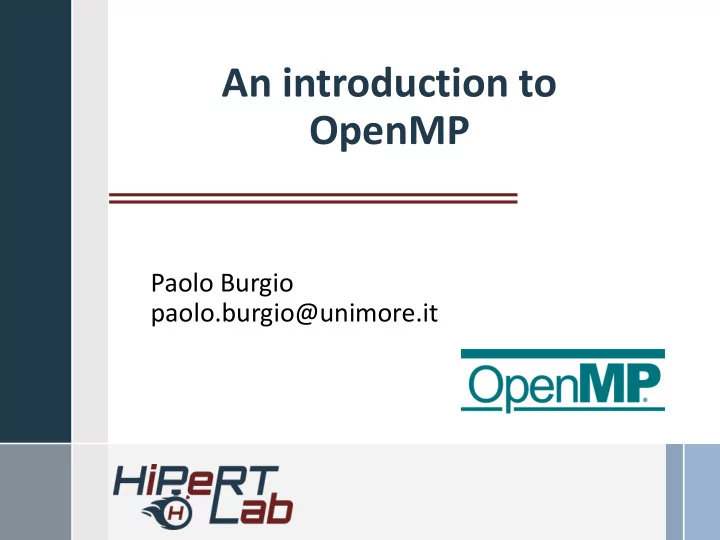

An introduction to OpenMP Paolo Burgio paolo.burgio@unimore.it
A history of OpenMP › 1997 – OpenMP for Fortran 1.0 › 1998 – OpenMP for C/C++ 1.0 › 2000 Regular, loop-based parallelism – OpenMP for Fortran 2.0 › 2002 – OpenMP for C/C++ 2.5 › 2008 – OpenMP 3.0 Irregular, parallelism ➔ tasking › 2011 – OpenMP 3.1 › 2014 Heterogeneous parallelism, à la GP-GPU – OpenMP 4.5 2
What is OpenMP? › Let's start from definition eng.wikipedia.org – https://en.wikipedia.org/wiki/OpenMP OpenMP (Open Multi-Processing) is an application programming interface (API) that supports multi-platform shared memory multiprocessing programming in C, C++, and Fortran, on most platforms, processor architectures and operating systems, including Solaris, AIX, HP-UX, Linux, OS X, and Windows. It consists of a set of compiler directives, library routines, and environment variables that influence run-time behavior 3
Application Programming Interface eng.wikipedia.org OpenMP (Open Multi-Processing) is an application programming interface (API) that supports multi-platform shared memory multiprocessing programming in C, C++, and Fortran, on most platforms, processor architectures and operating systems, including Solaris, AIX, HP-UX, Linux, OS X, and Windows. It consists of a set of compiler directives, library routines, and environment variables that influence run-time behavior › Eases programmers' life › Can be specific for specific domain – Web, Databases…for parallel programming › Examples – POSIX Threads – CUDA – OpenCL – … PARALLEL PROGRAMMING LT – 2017/18 4
A mix of … eng.wikipedia.org OpenMP (Open Multi-Processing) is an application programming interface (API) that supports multi-platform shared memory multiprocessing programming in C, C++, and Fortran, on most platforms, processor architectures and operating systems, including Solaris, AIX, HP-UX, Linux, OS X, and Windows. It consists of a set of compiler directives, library routines, and environment variables that influence run-time behavior › Many ways to do the same things – Linux-like philosohpy – What's the difference? 5
Why OpenMP? › What makes it better e.g., than PThreads? – Pragma-based interface – Transparent threading and memory management – We will this soon… › What's missing? – Poor control on threads (no scheduling) – "Team of threads" "it's elegant and appealing" – Automatic memory management › What's left? – Programmer is in charge of synchronization – Programmer is in charge of memory consistency – As opposite to..caches 6
Cross-platform, cross-language › OpenMP is a full technological stack eng.wikipedia.org OpenMP (Open Multi-Processing) is an application programming interface (API) › With a set of tools that supports multi-platform shared memory multiprocessing programming in C, – Compiler, runtime, OS support C++, and Fortran, on most platforms, processor architectures and operating systems, including Solaris, AIX, HP-UX, Linux, OS X, and Windows. It consists of a › That ensures portability!! set of compiler directives, library routines, and environment variables that influence run-time behavior 7
Find the difference › Between … – A standard – An implementation › A standard usually gives guidelines on – Behavior – (Common) Interface – De facto vs de iure › A implementation is – Platform(s)-specific – Lanugage(s)-specific – Has specific performance/Quality-of-Service QoS 8
Shared memory › As opposite to "physically" partitioned memory eng.wikipedia.org OpenMP (Open Multi-Processing) is an application programming interface (API) › Traditional "sequential" programming style that supports multi-platform shared memory multiprocessing programming in C, C++, and Fortran, on most platforms, processor architectures and operating systems, including Solaris, AIX, HP-UX, Linux, OS X, and Windows. It consists of a set of compiler directives, library routines, and environment variables that influence run-time behavior 9
Shared memory › Coherence problem – Memory consistency issue – Data races › Can share data ptrs Process – Ease-to-use T T P0 T › Several paradigm ("flavours") – Symmetric Multiprocessing (read, write) (read, write) – Distributed Shared memory – Partitioned Global Access Space Shared memory DATUM 10
Multi-processing › What is multi-processing? eng.wikipedia.org OpenMP (Open Multi-Processing) is an application programming interface (API) that supports multi-platform shared memory multiprocessing programming in C, C++, and Fortran, on most platforms, processor architectures and operating systems, including Solaris, AIX, HP-UX, Linux, OS X, and Windows. It consists of a set of compiler directives, library routines, and environment variables that influence run-time behavior 11
Outline › Expressing parallelism – Understanding parallel threads › Memory Data management – Data clauses › Synchronization – Barriers, locks, critical sections › Work partitioning – Loops, sections, single work, tasks… › Execution devices – Target 12
References › "Calcolo parallelo" website – http://hipert.unimore.it/people/paolob/pub/PhD/index.html › My contacts – paolo.burgio@unimore.it – http://hipert.mat.unimore.it/people/paolob/ › Useful links – http://www.openmp.org › A "small blog" – http://www.google.com 22
Recommend
More recommend